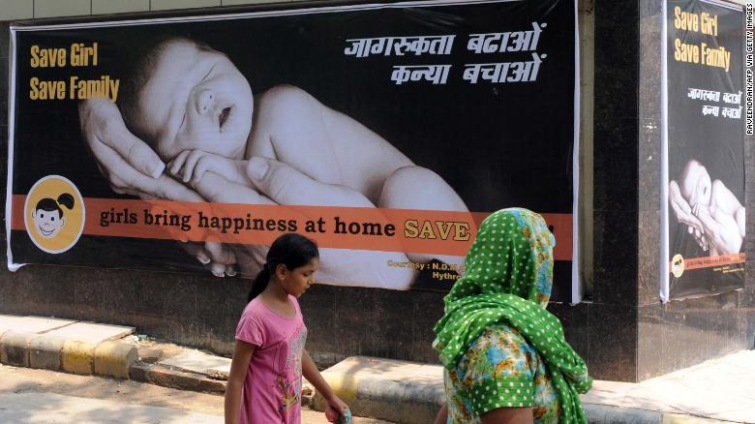
Audio By Carbonatix
A man in northern India was arrested after slashing his pregnant wife's stomach with a sickle, allegedly to find out the unborn baby's gender, according to police and the woman's relatives.
The attack, which took place on Saturday, caused the baby's death and left the mother in critical condition.
She remains hospitalized in intensive care in the capital New Delhi, said police in Budaun, Uttar Pradesh state.
"He attacked her with a sickle and ripped her stomach saying that he wanted to check the gender of the unborn child," according to the woman's brother, Golu Singh.The couple already have five daughters.
Police said the baby was stillborn late on Sunday and the husband had been remanded in custody.
India has long struggled with pervasive gender inequality and a preference for sons over daughters, which are often viewed as economic burdens -- reinforced by cultural practices like requiring a bride to provide a dowry.
Some couples will keep trying until a boy is born, leading to the birth of tens of millions of "unwanted" girls, according to the 2017-18 Economic Survey. Abortion is legal in India, but sex-selective terminations, which often target female fetuses, are not.
But still, hundreds of thousands of female fetuses are aborted every year in India, according to US-based NGO Invisible Girl Project. As a result, India has one of the most skewed sex ratios in the world.
For every 107 males born in the country, there are 100 females. According to the World Health Organization, the global natural sex ratio at birth is 105 males for every 100 females.
Even if a daughter is born instead of aborted, they often face higher mortality rates due to inadequate care; a 2018 study found that an estimated 239,000 girls under the age of five die in India every year due to gender-based neglect.
The areas worst affected by this problem are typically in rural regions, with low levels of education, high population densities and high birth rates.
Some of the ingrained preference is due to the norms governing inheritance, the dowry requirement, the tradition of women joining their husband's households, and rituals which need to be performed by male children.
Latest Stories
-
‘Adom FM’s Strictly Highlife’ lights up La Palm with a night of rhythm and nostalgia
4 minutes -
Ghana is rising again – Mahama declares
5 hours -
Firefighters subdue blaze at Accra’s Tudu, officials warn of busy fire season ahead
5 hours -
New Year’s Luv FM Family Party in the park ends in grand style at Rattray park
5 hours -
Mahama targets digital schools, universal healthcare, and food self-sufficiency in 2026
6 hours -
Ghana’s global image boosted by our world-acclaimed reset agenda – Mahama
6 hours -
Full text: Mahama’s New Year message to the nation
6 hours -
The foundation is laid; now we accelerate and expand in 2026 – Mahama
6 hours -
There is no NPP, CPP nor NDC Ghana, only one Ghana – Mahama
6 hours -
Eduwatch praises education financing gains but warns delays, teacher gaps could derail reforms
6 hours -
Kusaal Wikimedians take local language online in 14-day digital campaign
7 hours -
Stop interfering in each other’s roles – Bole-Bamboi MP appeals to traditional rulers for peace
8 hours -
Playback: President Mahama addresses the nation in New Year message
8 hours -
Industrial and Commercial Workers’ Union call for strong work ethics, economic participation in 2026 new year message
10 hours -
Crossover Joy: Churches in Ghana welcome 2026 with fire and faith
10 hours

